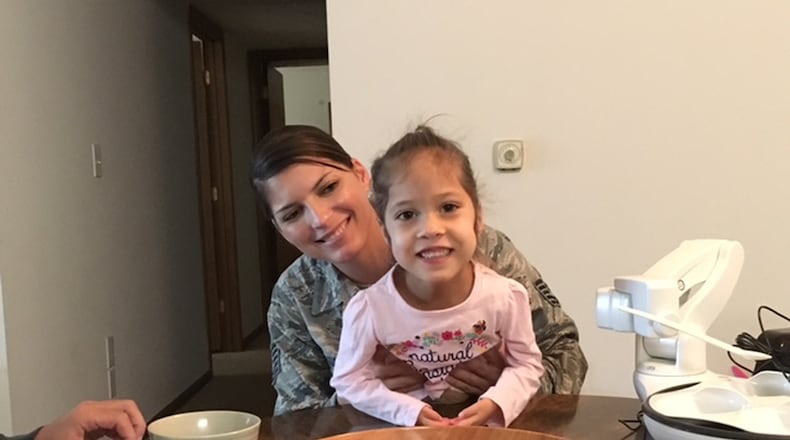A small local company led by a University of Dayton mechanical engineering graduate helped engineer that smile.
The company called “Desin” (pronounced “design”) designed Grace’s robot companion, which is roughly the size of a salad bowl holding four smaller bowls or compartments.
Dubbed “Obi,” an attached, jointed arm can be programmed to lift a magnetized spoon filled with food from one of Obi’s compartments or bowls to a person’s mouth.
The device was a winner this year in the 54th annual R&D 100 awards, arranged by R&D magazine, in the awards’ “mechanical and materials” category.
For Desin, Obi could be the start of what company leaders hope will be a line of consumer robotics.
“It’s a state-of-the-art, revolutionary dining robot,” said Jon Dekar, Desin co-founder and president. “It’s really the first of its kind.”
FAMILY DINNERS
For the Golembiewski family, though, Obi simply means more relaxed meals, including today’s family gathering for Thanksgiving.
Grace Golembiewski has been diagnosed with arthrogryposis multiplex congenita. The child has a number of joint “contractures,” or joints that are stiff and hard to move. She has limited movement in her arms and needs assistance walking.
Before Obi, meals could be a challenge for the Golembiewski family. Already underweight, Grace’s efforts in trying to eat burned more calories than the food offered, said Grace’s mother, Amanda Golembiewski, an Air Force tech sergeant.
“It’s allowed all of us to have one dinner as a family, instead of one person feeding Grace,” Amanda said. “It allows us to have a family dinner.”
Scott Stone, a Desin executive, read of the Golembiewski family last year in the Skywrighter, the Wright Patterson Air Force Base newspaper. He invited the Fairborn family to try an Obi unit in the summer of 2015.
The family liked the device so much, Grace’s father, Paul Golembiewski, also an Air Force tech sergeant, started working for Desin part-time to help the company with marketing and sales.
“It worked out great,” Paul said.
Though new — the robot was formally launched in July — Obi already has an impressive local pedigree. Dekar, a UD graduate, said Gem City Engineering — near Desin’s Dayton offices at the Entrepreneurs Center in the Tech Town business park — is starting to produce the robots.
BUILDING OBI
Gem City will procure or make the parts needed to assemble the units, said David Meyer, operations director at Gem City Engineering.
The company hopes to build 150 of the robots a month, Meyer said. About a dozen of the company’s more than 100 employees will be involved in procurement, assembly and shipping for the device.
Gem City has assembled robots before, including bomb disposal and sewer inspection units, he said.
But he agreed Obi is special.
“I think it’s great,” Meyer said. “It’s a great opportunity to lend a hand to our aging population, to help with the shortage of skilled nurses. It will be of great assistance to all those folks.”
Dekar said Obi has been years in the making, springing from early ideas he had as a high-schooler and a UD engineering student. He had watched his grandfather suffer from a degenerative neuro-muscular disease.
“I saw him slowly decline to the point where he would have to be fed by my grandmother,” Dekar said. “And he hated it.”
The key to Obi is adaptability, its creators say. Even if a diner can’t move a limb, the ability to wiggle a toe, blink an eye or even wrinkle a forehead can trigger available switches to launch Obi’s robotic arm, Dekar said.
“There is some sort of switch, that’s off the shelf, that can plug into Obi so they can easily control it,” he said. “All it takes is just a momentary activation. You just have to touch it.”
Powered by a rechargeable battery, Desin says its Obi holds enough energy to serve four to six meals on a single charge.
Desin says it is offering trials of Obi, along with direct-to-customer in-house rental and leasing options to make the device — currently with a retail price of $4,500 — more accessible to users without working through a third party health care equipment or finance organization.
Purchase, lease and rental information are available at www.meetobi.com.
Six-year-old Desin is based in Bloomfield Hills, Mich. with operations in Michigan and Dayton. The company is privately-held and is funded by individual and institutional investors. Dekar said he is securing a distribution agreement for the devices.
SERVING OTHERS
Dennis Grant, executive director of United Rehabilitation Services of Greater Dayton, where Grace attends pre-school, said his agency likes Obis enough to seek grants to purchase several of them, maybe four or five. URS serves people with “complex conditions” that might make “intensive assistance” necessary, he said.
URS maintains a ratio of one staff person for every person who needs care. But meals can be as challenging for URS as for families, Grant said.
“If you think about lunch-time, when we have 100 people who need to be fed … it’s a heavy toll,” he said. “It could free up our staff to help take care of others.”
URS — a non-profit Dayton agency with a 60-year history of serving children and adults with disabilities — is seeking grant funding, perhaps from local foundation, to obtain the Obis
“This is something I think we’ve been looking for, for a long time,” Grant said.
About the Author

